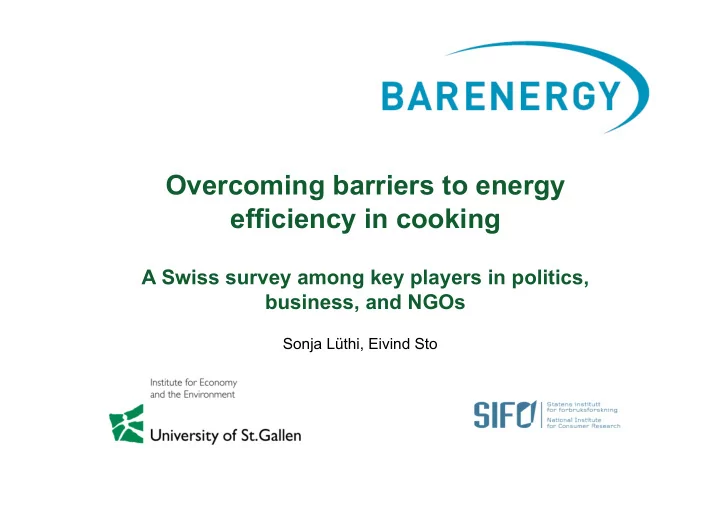

Overcoming barriers to energy efficiency in cooking A Swiss survey among key players in politics, business, and NGOs Sonja Lüthi, Eivind Sto
Content 1. The BARENERGY Project 2. Problem Statement 3. Research Questions 4. Methodology 5. Theoretical Framework 6. Purchase of Energy Efficient Refrigerators and Cooking Pans 7. Energy Efficient Cooking Behavior 8. Conclusion - 2 -
1. The BARENERGY Project (1) Aim • Identification of the relevance and strengths of various barriers for energy behavior changes among end consumers and households • Identification of and discussion how activities from political authorities, energy producers and NGOs can overcome these barriers Methodology • WP2: State of the Art: energy regimes • WP3: Literature review • WP4: Qualitative interviews with stakeholders from policy, business and NGOs • WP5: Quantitative consumer survey • WP6: Focus groups - 3 -
1. The BARENERGY Project (2) Topic Areas • Domestic energy use: – Heating of residences (turn down and switch off) – Power supply (Change to sustainable energy resources) • Household appliances: – Purchase of domestic appliances – Use of domestic appliances • Mobility: – Purchase of car (energy efficiency) – Use of car (drive less or more economically) - 4 -
1. The BARENERGY Project (2) Topic Areas • Domestic energy us e: – Heating of residences (turn down and switch off) – Power supply (Change to sustainable energy resources) • Household appliances: – Purchase of domestic appliances refrigerators and cooking pans – Use of domestic appliances cooking • Mobility: – Purchase of car (energy efficiency) – Use of car (drive less or more economically) - 5 -
2. Problem Statement: Highest Saving Potential in the Use Phase Example: Zürich, Switzerland, 2005 Source: Bush et al. (2007) - 6 -
3. Research Questions Identification of barriers for change: What are the main barriers to sustainable energy consumption in cooking? Past Attempts to over barriers What has been done to overcome these barriers and how successful was it? Recommendations for the future and relevant stakeholders What should be done and by whom? - 7 -
4. Theoretical Framework Combination of the institutional approach • Political barriers • Cultural-normative barriers • Economic barriers with the individual perspectives on consumer behavior related to energy consumption • Individual-psychological barriers • Knowledge based barriers and the structural approach (as both practices never take place in a vacuum) • Physical and structural barriers - 8 -
5. Methodology: Qualitative Interviews Interviewed Stakeholders • Policy: Political authorities from national and municipal level, Semi-public institutions, • Business: appliance industry interest groups, appliance manufactures, • Academia: educators • NGOs Interviews • 13 20-40 min face-to-face interviews • Open questions and rating - 9 -
6. Purchase of energy efficient appliances/ cooking ware - 10 -
6.1 Barriers to energy efficient Appliances (purchase) Individual Barriers • Knowledge – the connection to issues of energy efficiency and energy use is not always made, especially in regard to cooking pans – complete life-cycle costs are often unknown • Individual barriers – price and design are the main buying criteria – energy efficiency is not a relevant part of the utility function - 11 -
6.1 Barriers to energy efficient Appliances (purchase) Institutional Barriers • Market – unclear rating of the labelling of refrigerators and freezers – no labelling for cooking pans – distribution channel – refrigerators are rarely bought in retail stores • Civil Society – incompetent salespeople Structural Barriers – Higher initial costs, resp. different investment profil - 12 -
6.2 Relevant Stakeholders Political decision makers: labels, bans Salespeople: competent advice, point out energy consumption Household appliance industry: manufacture energy-efficient devices - 13 -
6.3 Past Attempts to overcome the Barriers convince consumers of the importance of energy efficiency • awareness raising: consumer magazines, daily newspapers, TV etc. • Some manufacturers have their own personnel in high-traffic retail stores voluntary measures • energy label • agreements with the household appliance industry - 14 -
6.4 Possibilities for future Actions sell energy efficiency as a side effect • lower price • good design • new brand labeling • improvement for fridges • introduction for cooking pans regulations and minimus standards • remove the worst appliances from the market • produce only energy-efficient appliances - 15 -
7. Energy efficient cooking - 16 -
7.1 Barriers to Energy Efficient Cooking Individual Barriers • Knowledge – lack of awareness about energy efficiency – lack of information about the specific actions • Individual barriers – energy-efficiency is not seen as important in cooking: good taste, healthy and quick preparation are important Structual Barriers – Lack of immediate feed-back - 17 -
7.2 Relevant Stakeholders cooking teachers salespeople media - 18 -
7.3 Possibilities for future Actions more concrete information for consumers • Cooking schools • household appliance salespeople Consumers should be exposed to energy efficient cooking tips in as many different places as possible • newspapers and magazines recipes • usage instructions for stoves and pans • on food packaging - 19 -
8. Conclusions Purchase • of appliances: individual-psychological barrier obligatory measures • of cooking ware: knowledge barriers Energy label Cooking behavior: • individual-psychological and knowledge barrier awareness raising and smart metering - 20 -
Discussion Research about energy efficient cooking? Publication? - 21 -
Recommend
More recommend